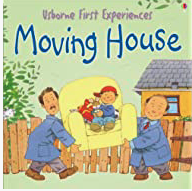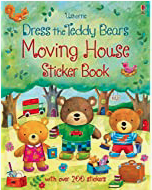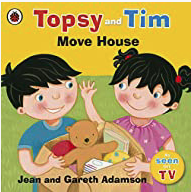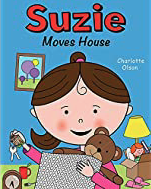How do I prepare my child for moving house?
Written by Claire Burgess, Family Consultant
They say that moving house can be one of the most stressful things you can do…if you then add in supporting children when moving house, it really can be a challenging time! In this blog I am going to give you some ideas as to how you can make the whole process easier for your child/ren and you!
It can be emotional…
Moving house can be an exciting time but can also be an emotional time depending on your family situation. For some families who are just moving a few miles nothing much changes in relation to seeing friends and family, going to the same groups/nursery/school, but for others it can be a much bigger change which can mean moving to an area (or even country) that you don’t know, starting in new nurseries/schools etc which are all big changes and can have an impact on your child/ren.
We all experience different emotions when it comes to change and our children are no different. There can be mixed emotions for us all when moving house, from sadness to excitement, anger (not wanting to leave) to happiness at having a new house. There are no right or wrong emotions, we just need to be accepting that our children might be experiencing these too and we need to make sure that we acknowledge this from their perspective.
I have put some hints and tips to help with this below.
What can I do to help in the lead up to the move?
Letting them see photos of the new house can help them to visualise it. If you are able to visit with them and look around before moving then this can also help.
If you are moving further away and not able to visit the house, print off photos of the house and put them into an album so that your little one can look at them and ask any questions that they might have. It can also help to add photos of parks/playgrounds that are close by, even a photo of their new nursery or school so that this can be a talking point.
Depending on your child’s age, if possible try to involve them in planning their new room. By involving them in making decisions it can help them to have a sense of control or ownership of their area in the new house. However, it is important not to make too many changes or buy all new things as this can lead to your little one being a little more unsettled. Having things that are familiar to them will help with the transition - take things with you and slowly replace these over time as you settle into your new home – don’t do everything at once!
Read books with your child/ren about moving house (some examples below). This is also a great little video from CBeebies which might help.
If the new house is close by then try to take opportunities to walk/drive past the house and talk about it.
Going to parks or activities close to the new house can familiarise you all with the area.
Get them involved in the packing in advance of the move day so that they can have time to process that things will be packed up and some things can be given away as they are no longer needed. This helps to stop them feeling like everything is happening at once and that they have to make decisions quickly about what they do or do not want to pack.
Be clear and explain what is going to happen on the moving day. Think through the whole process and talk this through so it provides reassurance and opportunities for your little one to ask questions if they have them.
Here are some suggested books you could read together (a link to the books on Amazon is here):
Moving to another country
This can be a daunting yet exciting prospect for you as a family. The emotions you might be feeling can very much depend on the reason that you are moving countries. For some it can be to move to be closer to friends or family, and others it can be due to work, or because you are looking for an adventure. Whatever the reason for moving abroad, many of these hints and tips will be relevant and you can pick and choose which ones will work in your circumstances:
Explain to your child that people may be speaking a different language and that you are going to be learning this. Perhaps watch some children’s TV programmes in the new language prior to moving so that your little one can start to hear the language being spoken (if it is not already spoken at home). If the language is spoken at home then make sure that you have books etc. that are written in this language and read them before bed; this will help to immerse your little one in the language.
Talk to your child/ren about how your things will get to the new house/country as this might be a worry for them. Explain that it will need to be packed and it might need to go before you fly to make sure that it is there for you when you get there. Talk about the fact that it goes on a lorry/aeroplane/boat etc and is then delivered to the new house. Lots of explanation can really help.
If you are leaving friends and family to move, look at what you can do to maintain these connections, for example asking friends and family to make little videos, perhaps of them reading a story, which you can then play when you get to your new house. Put photos up around the new house so that your little one can see those people around them – again this helps with keeping things familiar.
Be clear on what is going to happen when you get to the new house. Talk about the new nursery/school, making new friends and the activities that you will be able to do. Also talk about when you will come back to visit friends and family.
Depending on the new country that you are moving to it might not be as easy to source things which are familiar to your child such as certain foods/snacks, your normal washing powder etc (smell can be very powerful for familiarity)/. Keeping clothes and bedding washed in the same washing powder for a few weeks can really help with the transition. So that you are confident your child will have things they like to eat in the first few weeks, you may also want to pack some of these familiar foods. You can then gradually move over to the new foods/snacks etc as you all settle in.
On moving day and beyond
Pack a bag with their favourite things to take with them to the new house. Having these things and being able to put them into their room or playroom will help them start to feel more at home.
Try to have their cot/bed set up first so that this is there for the evening. Keep all sheets etc the same as in your old house so that they smell familiar. If you use things such as blackout blinds, white noise etc then try to have these to hand for the first night in the new house.
During the first few weeks in the new house try to give opportunity for your little one to explore and spend time in different rooms so that they can start to build up an awareness of their new environment. This can be very important for their play areas but also their bedtime. Spending time in their new bedroom (away from bedtimes) can also help them to adjust to this new sleep space.
Try to keep with your normal routines as much as possible e.g. mealtimes, nap and bedtimes and having a bedtime routine that you normally follow to keep things as consistent as possible. You might find that for the first couple of weeks your little one is a little more unsettled and so keeping to a predictable routine will really help to settle things back down for them.
It can take some time for children to adjust to living in a new house and they can talk about preferring the old house or wanting to go back there. This can be a coping strategy during this period of change. Acknowledging this and saying things such as “You really liked our old house, we did lots of fun things there didn’t we? It’s ok to miss it or feel a little sad. Hopefully you will start to like this new house and we will have lots of fun here too.”
Introduce yourselves to the neighbours and involve your child in this so that they can get to know other people who live close to you. This also helps you to know other families who live close by and who your child might be able to play with.
Continue to have contact with friends and family who you used to live close to, either by having them come and visit the new house if they can, or organising for video calls etc to help your child not feel such a sense of loss.
As I mentioned at the start of this blog, moving can be very stressful for us as adults who have the ability to know what is coming next and who are able to plan for this change, but our children rely on us to provide them with the information and reassurance in order to feel safe and secure. The hints and tips above will hopefully help with this and make the process a little smoother for you all.
While you are here have a look at our video guides (webinars) on various topics including behaviour, sleep, play, toilet training and more - click here. Don’t forget that we also offer parent consultations should you need support with anything from sleep to behaviour and so much more! Details of the packages we offer can be found here.
We also have a podcast - ‘Newborn to Teen and Everything in Between’ – listen here.
This blog contains affiliate links.







